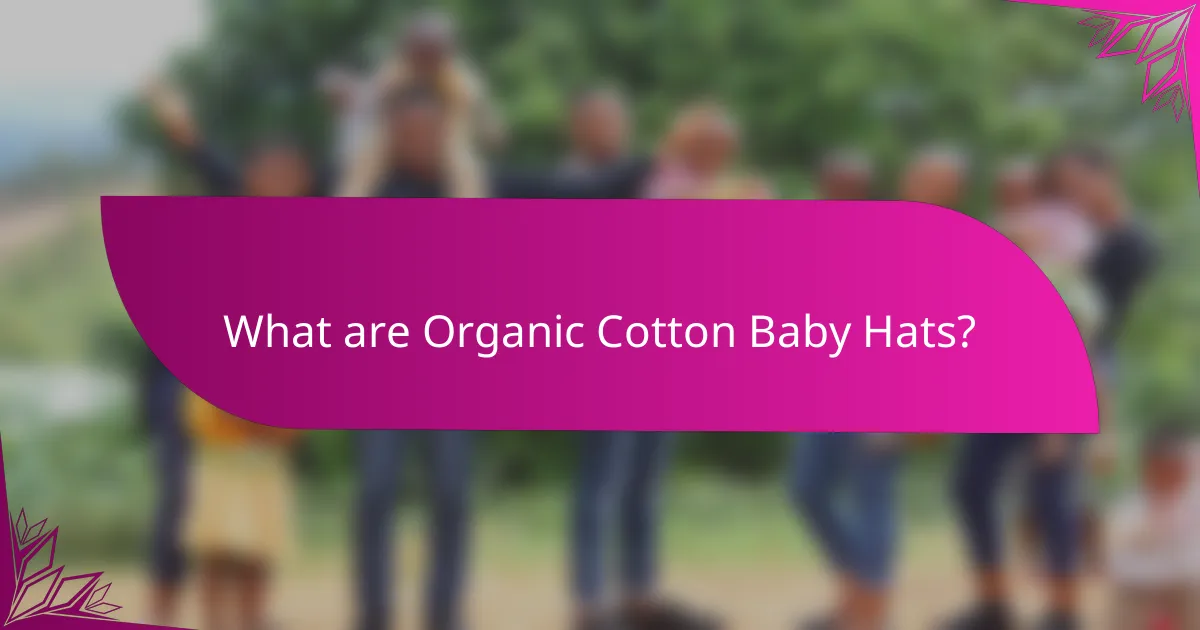
What are Organic Cotton Baby Hats?
Organic cotton baby hats are head coverings made from cotton that is grown without synthetic pesticides or fertilizers. They are designed for infants and toddlers, providing warmth and protection. Organic cotton is softer and safer for sensitive baby skin. These hats are often produced using environmentally friendly practices. Many parents prefer organic cotton for its hypoallergenic properties. It reduces the risk of skin irritation in babies. Organic cotton baby hats are also biodegradable, making them eco-friendly. They are available in various styles and colors, catering to different tastes and preferences.
How are Organic Cotton Baby Hats made?
Organic cotton baby hats are made through a process that prioritizes sustainability and safety. First, organic cotton is grown without synthetic pesticides or fertilizers. This ensures that the cotton is free from harmful chemicals. After harvesting, the cotton fibers are spun into yarn. The yarn is then knitted or woven into fabric suitable for baby hats.
Next, the fabric is cut into the desired shapes for the hats. Skilled workers sew the pieces together, ensuring quality and comfort. Finally, the hats are finished with labels and packaging. This entire process adheres to organic certification standards, guaranteeing the product’s integrity.
What materials are used in Organic Cotton Baby Hats?
Organic cotton baby hats are made primarily from organic cotton fibers. These fibers are grown without synthetic pesticides or fertilizers. This ensures a safe and non-toxic material for infants. Organic cotton is soft, breathable, and hypoallergenic. Some hats may also include natural dyes for coloring. Additionally, some designs incorporate a small percentage of spandex for stretch. This blend allows for a comfortable fit. The use of organic materials supports sustainable farming practices.
What distinguishes organic cotton from conventional cotton?
Organic cotton is grown without synthetic pesticides and fertilizers, while conventional cotton often uses these chemicals. This difference in cultivation methods results in organic cotton being more environmentally friendly. Organic farming practices promote biodiversity and soil health. According to the USDA, organic cotton farming uses crop rotation and natural pest control. These practices reduce the environmental impact associated with conventional cotton farming. Additionally, organic cotton is often softer and better for sensitive skin. The Global Organic Textile Standard (GOTS) certifies organic cotton products to ensure they meet strict environmental and social criteria.
What benefits do Organic Cotton Baby Hats provide?
Organic Cotton Baby Hats provide several benefits. They are made from natural fibers, which are soft and gentle on a baby’s sensitive skin. Organic cotton is free from harmful chemicals, making it safer for infants. These hats help regulate body temperature, keeping babies warm in cooler weather. They are breathable, reducing the risk of overheating. Organic cotton is also hypoallergenic, minimizing allergic reactions. Additionally, these hats are durable and can withstand multiple washes without losing quality. This longevity makes them a cost-effective choice for parents. Overall, Organic Cotton Baby Hats combine comfort, safety, and practicality for newborns.
How do Organic Cotton Baby Hats contribute to a baby’s health?
Organic cotton baby hats contribute to a baby’s health by providing a soft, breathable fabric that reduces the risk of skin irritation. The natural fibers in organic cotton are hypoallergenic, making them suitable for sensitive skin. Additionally, organic cotton is free from harmful chemicals and pesticides, promoting a safer environment for infants. Studies indicate that organic cotton can lower the incidence of allergic reactions in babies. The breathable nature of the fabric helps regulate body temperature, preventing overheating. Furthermore, organic cotton supports sustainable farming practices, contributing to overall environmental health, which indirectly benefits future generations.
Why are Organic Cotton Baby Hats environmentally friendly?
Organic cotton baby hats are environmentally friendly because they are made from cotton grown without harmful pesticides and synthetic fertilizers. This method of farming promotes healthier soil and reduces water pollution. Organic cotton farming uses less water compared to conventional methods, conserving vital resources. Additionally, organic practices support biodiversity and protect ecosystems. According to the Organic Trade Association, organic cotton farming can reduce greenhouse gas emissions. This makes organic cotton baby hats a sustainable choice for parents concerned about environmental impact.
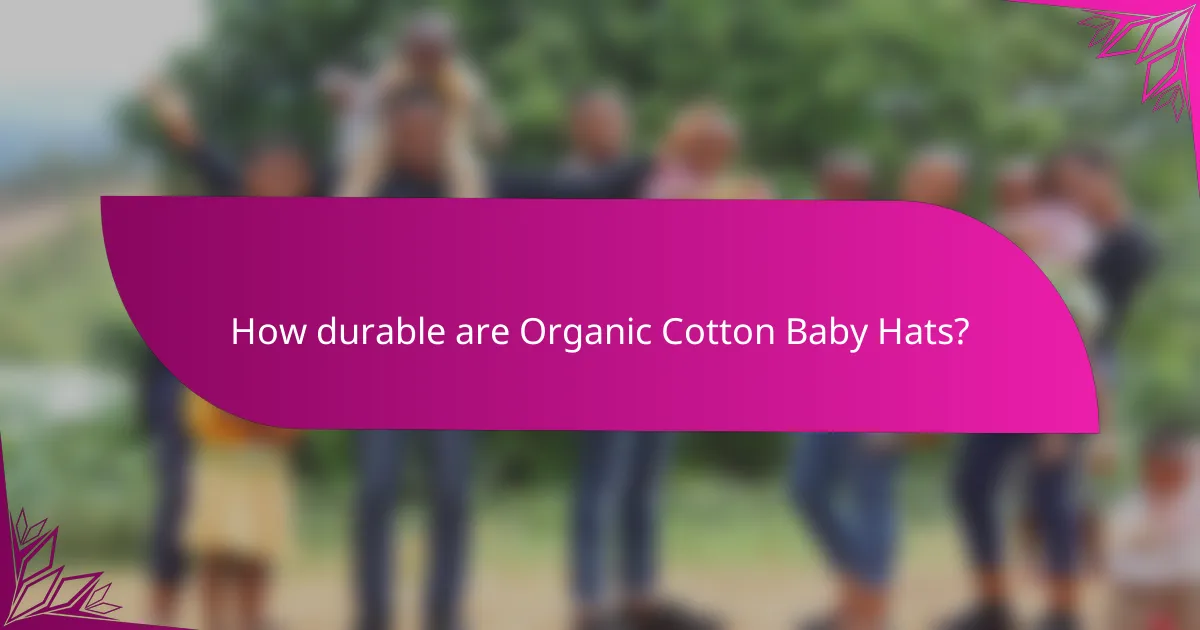
How durable are Organic Cotton Baby Hats?
Organic cotton baby hats are generally durable. They withstand regular use and washing. The fibers of organic cotton are strong and resilient. This material maintains its shape and color over time. Unlike conventional cotton, organic cotton is free from harmful chemicals. This contributes to its overall strength and longevity. Studies show that organic cotton products can last longer than those made from conventional cotton. Proper care enhances their durability further.
What factors affect the durability of Organic Cotton Baby Hats?
The durability of Organic Cotton Baby Hats is influenced by several factors. The quality of the cotton fibers plays a crucial role. High-quality organic cotton is generally stronger and more resilient. The manufacturing process also affects durability. Hats made with tighter weaves tend to last longer. Additionally, the dyeing process can impact fabric integrity. Non-toxic dyes are less likely to weaken fibers. Care instructions are vital for maintaining durability. Washing in cold water and air drying can prevent wear and tear. Lastly, the presence of any additional materials, such as blends with synthetic fibers, can enhance or diminish durability.
How does the quality of organic cotton impact durability?
The quality of organic cotton significantly impacts its durability. High-quality organic cotton fibers are longer and stronger. This results in a fabric that resists wear and tear better than lower quality cotton. Additionally, organic cotton is less processed, retaining its natural strength. Studies show that organic cotton garments can last longer due to their superior fiber integrity. This durability is essential for products like baby hats, which require resilience to withstand frequent use and washing.
What are common wear and tear issues with Organic Cotton Baby Hats?
Common wear and tear issues with organic cotton baby hats include fading, fraying seams, and loss of elasticity. Fading occurs due to exposure to sunlight and frequent washing. Fraying seams can result from regular use and washing cycles. Loss of elasticity happens over time, especially with frequent stretching. These issues can impact the hat’s fit and appearance. Regular care can help mitigate these problems. Washing in cold water and air drying can extend the hat’s lifespan.
How can you ensure the longevity of Organic Cotton Baby Hats?
To ensure the longevity of organic cotton baby hats, wash them in cold water. Cold water prevents shrinkage and maintains fabric integrity. Use a gentle detergent without harsh chemicals. Avoid bleach, as it can weaken fibers. Air dry the hats to prevent heat damage from dryers. If necessary, use a low heat setting when machine drying. Store the hats in a cool, dry place to avoid mold and mildew. Regularly check for signs of wear, such as fraying or fading. Following these care instructions can extend the life of the hats significantly.
What care instructions should be followed for Organic Cotton Baby Hats?
Organic cotton baby hats should be washed in cold water. Use a gentle cycle to prevent damage. Avoid bleach and fabric softeners. Air drying is recommended to maintain shape. If using a dryer, select a low heat setting. Iron on a low setting if necessary. Store in a cool, dry place to avoid mildew. These instructions help preserve the softness and integrity of the fabric.
How should Organic Cotton Baby Hats be washed and dried?
Organic cotton baby hats should be washed in cold water on a gentle cycle. Use a mild detergent to prevent damage. Avoid bleach, as it can harm the fabric. For drying, air dry the hats to maintain their shape and integrity. If using a dryer, set it to a low heat setting. High heat can shrink organic cotton. Following these care instructions helps preserve the softness and durability of the hats.
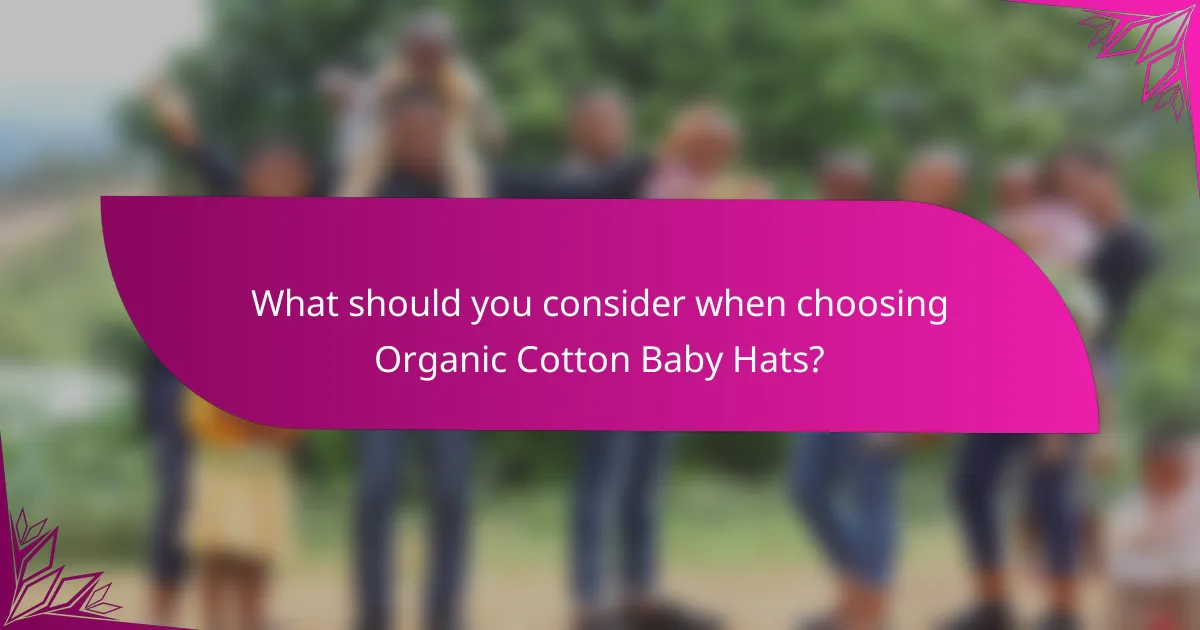
What should you consider when choosing Organic Cotton Baby Hats?
When choosing Organic Cotton Baby Hats, consider the fabric’s softness and breathability. Organic cotton is grown without harmful chemicals, ensuring safety for sensitive skin. Check for certifications like GOTS (Global Organic Textile Standard) to verify organic claims. Evaluate the hat’s fit to ensure comfort and prevent slipping. Look for hats with adjustable features for a better fit as your baby grows. Consider the hat’s design and style to match your baby’s wardrobe. Lastly, assess the ease of care, as machine-washable options are practical for parents.
What styles and sizes are available for Organic Cotton Baby Hats?
Organic cotton baby hats are available in various styles and sizes. Common styles include beanies, sun hats, and bonnets. Sizes typically range from newborn to toddler, accommodating head circumferences from 13 to 20 inches. These options ensure a comfortable fit for babies at different growth stages. The variety in styles allows for both functionality and fashion, catering to different occasions and preferences.
How do you select the right size for your baby?
To select the right size for your baby, measure their head circumference. Use a soft measuring tape and wrap it around the widest part of the head. Compare the measurement to size charts provided by manufacturers. Typically, sizes are categorized by age ranges. For example, newborns often require sizes 0-3 months. As babies grow, their head size increases, necessitating larger hats. Always consider the fabric’s stretchability, especially with organic cotton. A snug fit is essential, but it should not be too tight. Regularly check your baby’s size as they grow to ensure comfort and proper fit.
What styles are most popular among parents?
The most popular styles among parents for baby hats include beanies, sun hats, and floppy hats. Beanies are favored for their warmth and snug fit. Sun hats are chosen for their broad brims that provide sun protection. Floppy hats are appreciated for their versatility and trendy look. According to a survey by the Baby Products Association, 65% of parents prefer hats that offer UV protection. This trend reflects a growing awareness of sun safety for infants.
What are some tips for maintaining Organic Cotton Baby Hats?
To maintain Organic Cotton Baby Hats, wash them in cold water to prevent shrinking. Use a gentle detergent that is free from harsh chemicals. Avoid bleach as it can damage the fabric. Air dry the hats to maintain their shape and softness. If necessary, iron on a low setting to remove wrinkles. Store them in a cool, dry place to prevent mold or mildew. Regularly check for wear and tear to ensure safety for your baby. Following these tips will help prolong the life of the hats while keeping them safe and comfortable for your child.
How can you remove stains from Organic Cotton Baby Hats?
To remove stains from organic cotton baby hats, start by treating the stain promptly. Blot the stain with a clean cloth to absorb excess liquid. Use a gentle detergent mixed with water to create a solution. Apply the solution directly to the stain with a soft cloth or sponge. Gently rub the area in a circular motion. Rinse the hat thoroughly with cold water to remove detergent residue. Air dry the hat away from direct sunlight. Organic cotton is sensitive to heat, so avoid using a dryer. Following these steps helps maintain the fabric’s integrity and color.
What storage practices help preserve Organic Cotton Baby Hats?
Store Organic Cotton Baby Hats in a cool, dry place to prevent moisture damage. Use breathable storage containers or cotton bags to allow airflow. Avoid plastic bags, as they can trap humidity and lead to mold. Keep hats away from direct sunlight to prevent fading and deterioration. Fold hats neatly to maintain their shape and avoid creasing. Regularly check stored hats for any signs of pests or damage. These practices help prolong the lifespan and maintain the quality of organic cotton baby hats.
Organic cotton baby hats are head coverings made from cotton grown without synthetic pesticides or fertilizers, designed for infants and toddlers. This article explores the benefits of organic cotton baby hats, highlighting their softness, hypoallergenic properties, and environmental friendliness. It details the manufacturing process, durability, and care instructions to ensure longevity. Additionally, the article discusses how to choose the right size and style, as well as maintenance tips to preserve their quality. Overall, it provides comprehensive information for parents considering organic cotton baby hats for their children.
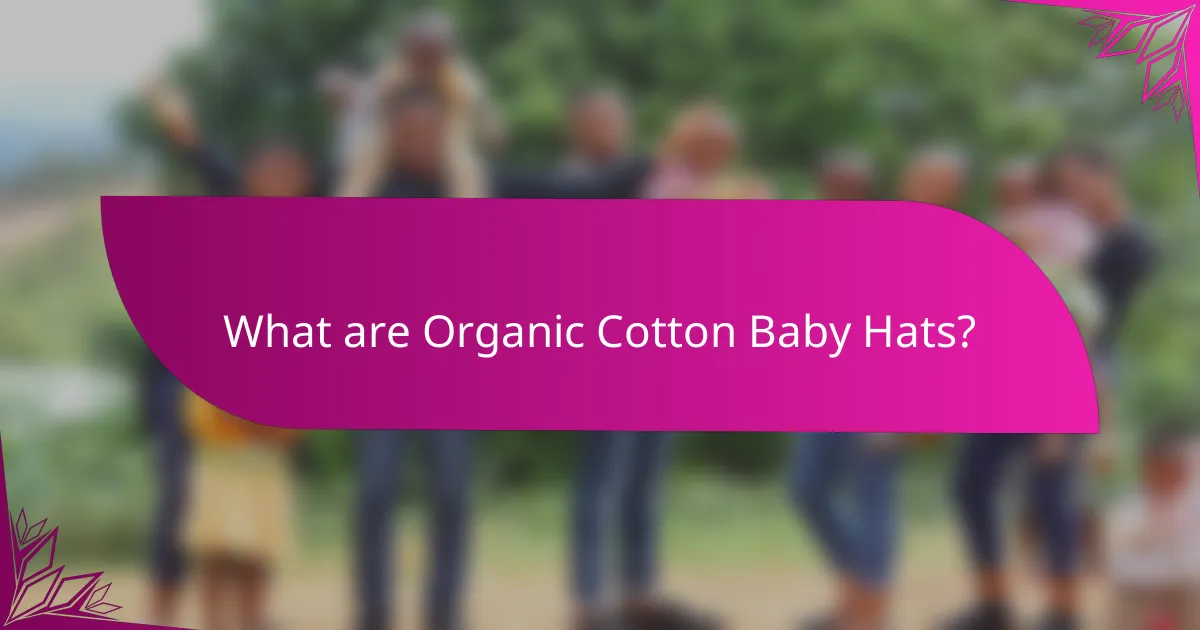
What are Organic Cotton Baby Hats?
Organic cotton baby hats are head coverings made from cotton that is grown without synthetic pesticides or fertilizers. They are designed for infants and toddlers, providing warmth and protection. Organic cotton is softer and safer for sensitive baby skin. These hats are often produced using environmentally friendly practices. Many parents prefer organic cotton for its hypoallergenic properties. It reduces the risk of skin irritation in babies. Organic cotton baby hats are also biodegradable, making them eco-friendly. They are available in various styles and colors, catering to different tastes and preferences.
How are Organic Cotton Baby Hats made?
Organic cotton baby hats are made through a process that prioritizes sustainability and safety. First, organic cotton is grown without synthetic pesticides or fertilizers. This ensures that the cotton is free from harmful chemicals. After harvesting, the cotton fibers are spun into yarn. The yarn is then knitted or woven into fabric suitable for baby hats.
Next, the fabric is cut into the desired shapes for the hats. Skilled workers sew the pieces together, ensuring quality and comfort. Finally, the hats are finished with labels and packaging. This entire process adheres to organic certification standards, guaranteeing the product’s integrity.
What materials are used in Organic Cotton Baby Hats?
Organic cotton baby hats are made primarily from organic cotton fibers. These fibers are grown without synthetic pesticides or fertilizers. This ensures a safe and non-toxic material for infants. Organic cotton is soft, breathable, and hypoallergenic. Some hats may also include natural dyes for coloring. Additionally, some designs incorporate a small percentage of spandex for stretch. This blend allows for a comfortable fit. The use of organic materials supports sustainable farming practices.
What distinguishes organic cotton from conventional cotton?
Organic cotton is grown without synthetic pesticides and fertilizers, while conventional cotton often uses these chemicals. This difference in cultivation methods results in organic cotton being more environmentally friendly. Organic farming practices promote biodiversity and soil health. According to the USDA, organic cotton farming uses crop rotation and natural pest control. These practices reduce the environmental impact associated with conventional cotton farming. Additionally, organic cotton is often softer and better for sensitive skin. The Global Organic Textile Standard (GOTS) certifies organic cotton products to ensure they meet strict environmental and social criteria.
What benefits do Organic Cotton Baby Hats provide?
Organic Cotton Baby Hats provide several benefits. They are made from natural fibers, which are soft and gentle on a baby’s sensitive skin. Organic cotton is free from harmful chemicals, making it safer for infants. These hats help regulate body temperature, keeping babies warm in cooler weather. They are breathable, reducing the risk of overheating. Organic cotton is also hypoallergenic, minimizing allergic reactions. Additionally, these hats are durable and can withstand multiple washes without losing quality. This longevity makes them a cost-effective choice for parents. Overall, Organic Cotton Baby Hats combine comfort, safety, and practicality for newborns.
How do Organic Cotton Baby Hats contribute to a baby’s health?
Organic cotton baby hats contribute to a baby’s health by providing a soft, breathable fabric that reduces the risk of skin irritation. The natural fibers in organic cotton are hypoallergenic, making them suitable for sensitive skin. Additionally, organic cotton is free from harmful chemicals and pesticides, promoting a safer environment for infants. Studies indicate that organic cotton can lower the incidence of allergic reactions in babies. The breathable nature of the fabric helps regulate body temperature, preventing overheating. Furthermore, organic cotton supports sustainable farming practices, contributing to overall environmental health, which indirectly benefits future generations.
Why are Organic Cotton Baby Hats environmentally friendly?
Organic cotton baby hats are environmentally friendly because they are made from cotton grown without harmful pesticides and synthetic fertilizers. This method of farming promotes healthier soil and reduces water pollution. Organic cotton farming uses less water compared to conventional methods, conserving vital resources. Additionally, organic practices support biodiversity and protect ecosystems. According to the Organic Trade Association, organic cotton farming can reduce greenhouse gas emissions. This makes organic cotton baby hats a sustainable choice for parents concerned about environmental impact.
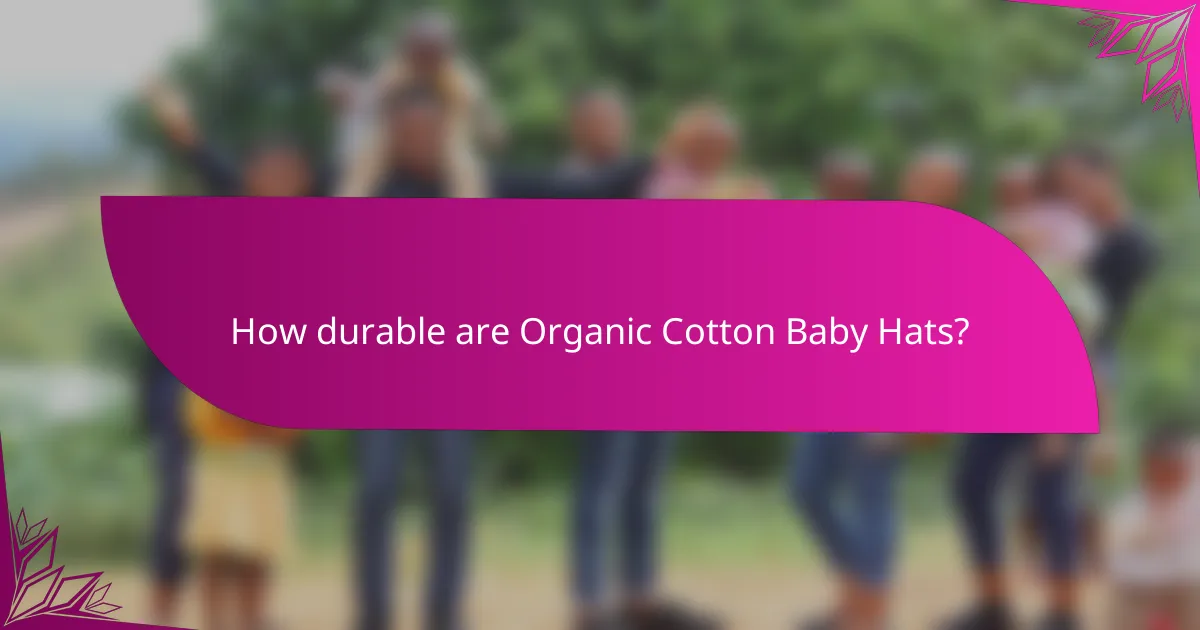
How durable are Organic Cotton Baby Hats?
Organic cotton baby hats are generally durable. They withstand regular use and washing. The fibers of organic cotton are strong and resilient. This material maintains its shape and color over time. Unlike conventional cotton, organic cotton is free from harmful chemicals. This contributes to its overall strength and longevity. Studies show that organic cotton products can last longer than those made from conventional cotton. Proper care enhances their durability further.
What factors affect the durability of Organic Cotton Baby Hats?
The durability of Organic Cotton Baby Hats is influenced by several factors. The quality of the cotton fibers plays a crucial role. High-quality organic cotton is generally stronger and more resilient. The manufacturing process also affects durability. Hats made with tighter weaves tend to last longer. Additionally, the dyeing process can impact fabric integrity. Non-toxic dyes are less likely to weaken fibers. Care instructions are vital for maintaining durability. Washing in cold water and air drying can prevent wear and tear. Lastly, the presence of any additional materials, such as blends with synthetic fibers, can enhance or diminish durability.
How does the quality of organic cotton impact durability?
The quality of organic cotton significantly impacts its durability. High-quality organic cotton fibers are longer and stronger. This results in a fabric that resists wear and tear better than lower quality cotton. Additionally, organic cotton is less processed, retaining its natural strength. Studies show that organic cotton garments can last longer due to their superior fiber integrity. This durability is essential for products like baby hats, which require resilience to withstand frequent use and washing.
What are common wear and tear issues with Organic Cotton Baby Hats?
Common wear and tear issues with organic cotton baby hats include fading, fraying seams, and loss of elasticity. Fading occurs due to exposure to sunlight and frequent washing. Fraying seams can result from regular use and washing cycles. Loss of elasticity happens over time, especially with frequent stretching. These issues can impact the hat’s fit and appearance. Regular care can help mitigate these problems. Washing in cold water and air drying can extend the hat’s lifespan.
How can you ensure the longevity of Organic Cotton Baby Hats?
To ensure the longevity of organic cotton baby hats, wash them in cold water. Cold water prevents shrinkage and maintains fabric integrity. Use a gentle detergent without harsh chemicals. Avoid bleach, as it can weaken fibers. Air dry the hats to prevent heat damage from dryers. If necessary, use a low heat setting when machine drying. Store the hats in a cool, dry place to avoid mold and mildew. Regularly check for signs of wear, such as fraying or fading. Following these care instructions can extend the life of the hats significantly.
What care instructions should be followed for Organic Cotton Baby Hats?
Organic cotton baby hats should be washed in cold water. Use a gentle cycle to prevent damage. Avoid bleach and fabric softeners. Air drying is recommended to maintain shape. If using a dryer, select a low heat setting. Iron on a low setting if necessary. Store in a cool, dry place to avoid mildew. These instructions help preserve the softness and integrity of the fabric.
How should Organic Cotton Baby Hats be washed and dried?
Organic cotton baby hats should be washed in cold water on a gentle cycle. Use a mild detergent to prevent damage. Avoid bleach, as it can harm the fabric. For drying, air dry the hats to maintain their shape and integrity. If using a dryer, set it to a low heat setting. High heat can shrink organic cotton. Following these care instructions helps preserve the softness and durability of the hats.
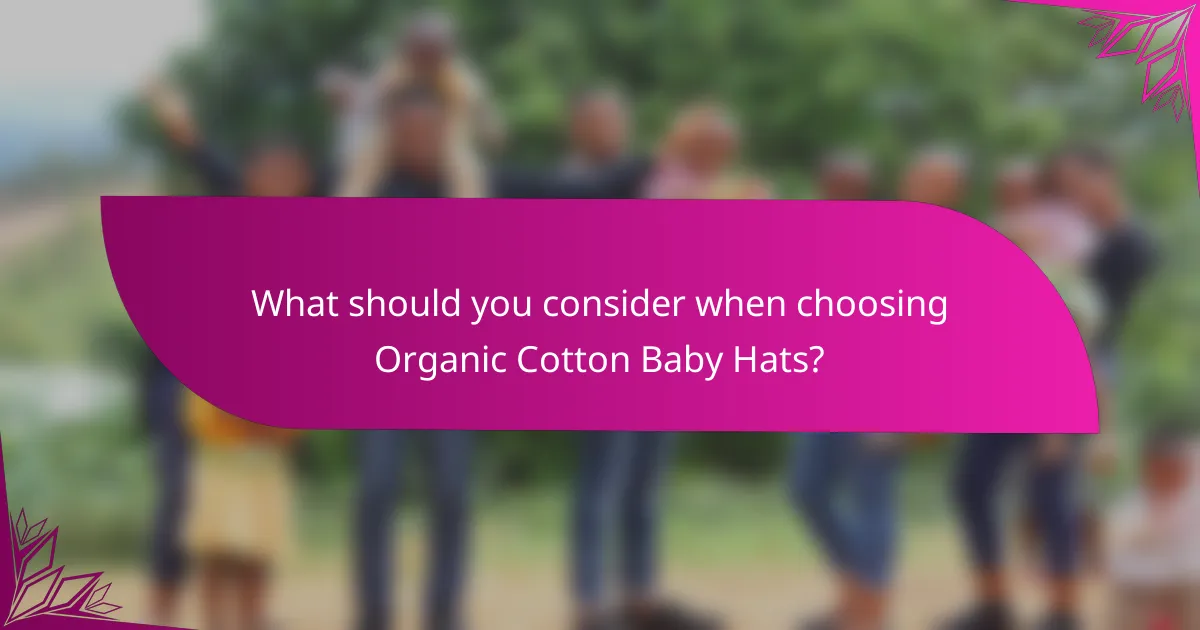
What should you consider when choosing Organic Cotton Baby Hats?
When choosing Organic Cotton Baby Hats, consider the fabric’s softness and breathability. Organic cotton is grown without harmful chemicals, ensuring safety for sensitive skin. Check for certifications like GOTS (Global Organic Textile Standard) to verify organic claims. Evaluate the hat’s fit to ensure comfort and prevent slipping. Look for hats with adjustable features for a better fit as your baby grows. Consider the hat’s design and style to match your baby’s wardrobe. Lastly, assess the ease of care, as machine-washable options are practical for parents.
What styles and sizes are available for Organic Cotton Baby Hats?
Organic cotton baby hats are available in various styles and sizes. Common styles include beanies, sun hats, and bonnets. Sizes typically range from newborn to toddler, accommodating head circumferences from 13 to 20 inches. These options ensure a comfortable fit for babies at different growth stages. The variety in styles allows for both functionality and fashion, catering to different occasions and preferences.
How do you select the right size for your baby?
To select the right size for your baby, measure their head circumference. Use a soft measuring tape and wrap it around the widest part of the head. Compare the measurement to size charts provided by manufacturers. Typically, sizes are categorized by age ranges. For example, newborns often require sizes 0-3 months. As babies grow, their head size increases, necessitating larger hats. Always consider the fabric’s stretchability, especially with organic cotton. A snug fit is essential, but it should not be too tight. Regularly check your baby’s size as they grow to ensure comfort and proper fit.
What styles are most popular among parents?
The most popular styles among parents for baby hats include beanies, sun hats, and floppy hats. Beanies are favored for their warmth and snug fit. Sun hats are chosen for their broad brims that provide sun protection. Floppy hats are appreciated for their versatility and trendy look. According to a survey by the Baby Products Association, 65% of parents prefer hats that offer UV protection. This trend reflects a growing awareness of sun safety for infants.
What are some tips for maintaining Organic Cotton Baby Hats?
To maintain Organic Cotton Baby Hats, wash them in cold water to prevent shrinking. Use a gentle detergent that is free from harsh chemicals. Avoid bleach as it can damage the fabric. Air dry the hats to maintain their shape and softness. If necessary, iron on a low setting to remove wrinkles. Store them in a cool, dry place to prevent mold or mildew. Regularly check for wear and tear to ensure safety for your baby. Following these tips will help prolong the life of the hats while keeping them safe and comfortable for your child.
How can you remove stains from Organic Cotton Baby Hats?
To remove stains from organic cotton baby hats, start by treating the stain promptly. Blot the stain with a clean cloth to absorb excess liquid. Use a gentle detergent mixed with water to create a solution. Apply the solution directly to the stain with a soft cloth or sponge. Gently rub the area in a circular motion. Rinse the hat thoroughly with cold water to remove detergent residue. Air dry the hat away from direct sunlight. Organic cotton is sensitive to heat, so avoid using a dryer. Following these steps helps maintain the fabric’s integrity and color.
What storage practices help preserve Organic Cotton Baby Hats?
Store Organic Cotton Baby Hats in a cool, dry place to prevent moisture damage. Use breathable storage containers or cotton bags to allow airflow. Avoid plastic bags, as they can trap humidity and lead to mold. Keep hats away from direct sunlight to prevent fading and deterioration. Fold hats neatly to maintain their shape and avoid creasing. Regularly check stored hats for any signs of pests or damage. These practices help prolong the lifespan and maintain the quality of organic cotton baby hats.